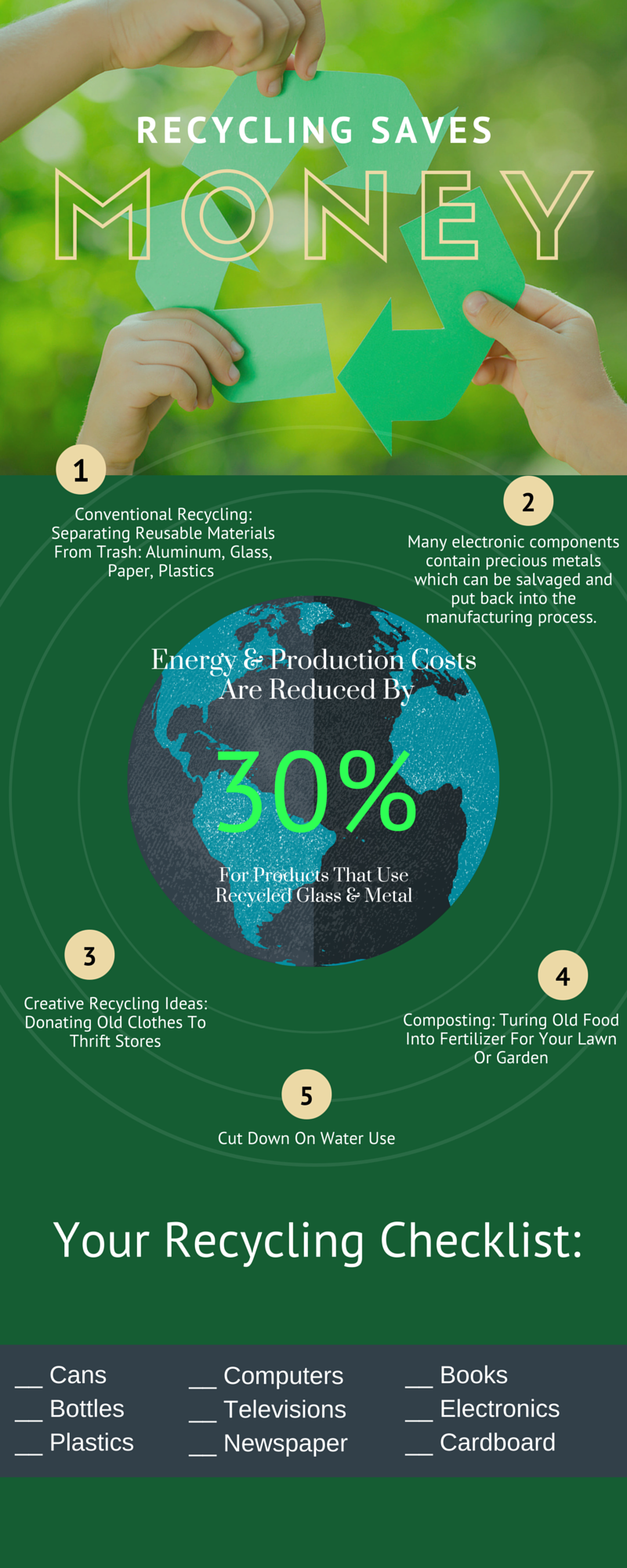Recycling Saves Money
Most people know the benefits that recycling has on the planet. We all want to leave a small carbon footprint, and keep the Earth as green as possible because ecosystems are fragile things. But did you also know that recycling can save money on both a small and large scale?
Some of our Financial Programs:
Conventional Recycling
Many people separate out their recyclables by aluminum, plastics, paper, and glass. While no one is really going to get rich off of recycling on a personal level, getting an entire neighborhood to commit to recycling, landfills don’t fill up as quickly, and the reusable materials (glass, paper, plastics, etc.) go back into making products, and keeping the overall cost of production down, which means prices stay where they are at the stores.
On a personal level, you can break down boxes and save them for when you need to pack things to ship, or when you are moving. You can take papers (newspapers, old notebooks, old textbooks, etc.) to local recycling plants. While many paper companies try to replant forests, the truth of the matter is that trees take time to grow to a point where they can be harvested, and any amount of recycled paper that can be used in the production of paper goods will not only keep the cost of products down, but will also reduce the consumption of a finite resource. Similarly, energy and production costs are reduced by up to 30% for products that use recycled glass and metal.
Computers, televisions, and most electronics can also be recycled. The silicon circuit boards are recyclable, and many electronic components contain precious metals which can be salvaged and put back into the manufacturing process. It may take a bit of research to find the places that recycle those items, because it often involves a highly specialized process, but the benefits of affordable technology are immeasurable in today’s world.
Creative Recycling
If you have older siblings, you might be familiar with the term “hand-me-downs.” That’s a way to extend the usefulness of clothing within a family. Outside of the household, old clothes (in decent condition) can be donated to various organizations or thrift stores. The same can be done with books, music, electronics, furniture, and almost anything you can think of. While you may never see the direct impact of these donations, you can feel good that by recycling these products, you are putting them in the hands of people who need them – for free or at a very inexpensive price – so that they can put the money that otherwise would have gone into buying new clothes (or other donated products) to other things, such as food, home repair, medical bills, or other “high priority” items.
On a similar note, you may find items that no longer function in their current state, and as such cannot be donated to any charity or thrift store. If you have a creative flair, you can take these broken things and turn them into art. Take ripped clothes and tear them into strips and weave funky rugs. Turn broken glass and old CDs into mosaics. Decorate a broken bike and turn it into a lawn ornament. Turn old bolts or pieces of broken toys into jewelry. These “repurposed” items can be given out as creative gifts, kept for yourself, or even sold for money. There’s a reason the adage “one person’s trash is another person’s treasure” exists. Look around you, and unleash your artistic self!
Obviously things like old food cannot be donated anywhere, but it can be recycled in the form of compost. Composting is great for your lawn or garden. In some cities, there are community gardens, and people recycle their own food and reap fresh produce. The truth is that rich top soil is also in rare supply, and wet, nutrient-rich compost can cut down on chemical lawn/plant food, and also the amount of water needed to grow plants. In many areas of the United States, water is budgeted during the summer, and cutting down on water use is great for the wildlife that depends on a water table that isn’t depleted for people to keep their lawns lush and green.
One last idea is to join your local Freecycle group. If you have items you aren’t using, or need to get rid of to make room for new things, post them on your local Freecycle site, and people looking for those items will gladly take them off your hands. Remember, recycling isn’t necessarily about putting money directly in your hands – it’s about reducing the cost of things all around and improving our planet in the process – and that’s worth everything.
- Recycle This – Interactive game to help teach kids about recycling
- Recycle Roundup Game For Kids
- Benefits of Recycling: Interesting Recycling Facts
- Benefits of Recycling: Why is Recycling Important?
- Kids Go Green
- Science Facts: Recycling Facts for Kids
- Earth’s 911
- Lighting Recycling Guide
- Paper, Plastic & More: A Kid’s Guide to Recycling & Environmental Conservation
- Kids Be Green
- Recycling Fact for Kids
- Fun Facts About Recycling – eHow Health
- Garbage Fact – Idaho Public Television
- Recycling for Kids – Benefits of Recycling

